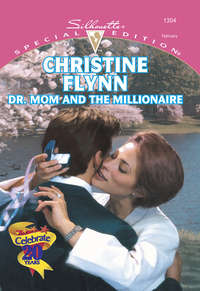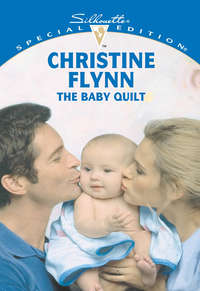
Полная версия
Forbidden Love
Nick stood on the front porch, his hands jammed at the waist of his worn jeans, and a faint V of sweat darkening the gray T-shirt stretched over his wide shoulders. The blue of his eyes looked as deep as sapphires as his glance ran from the scoop of her top, down the length of her bare legs and jerked back up to her face.
“I just wanted to let you know I was here before I started working,” he said without preamble, and turned away.
“Wait a minute.”
He was on the last of three steps leading from the wide wraparound porch when the door banged closed behind her. She stopped on the top one as he reached the walkway and reluctantly turned around.
“Grandma said no one would start for a couple of days.”
“Is my being here now a problem?”
She wasn’t surprised by the challenge in his tanned features. What struck her was the fatigue. It etched more deeply the faint white lines around his eyes, took some of the edge from his tone.
“I just wasn’t expecting anyone from your uncle’s company right now.” And I wasn’t expecting it to be you at all.
“My uncle’s already put in a full day,” he replied, explaining his own presence when she would have so clearly preferred someone else’s. “I had the time now, so I thought I’d get started.”
“So late?”
“There’re still a couple good hours of daylight left. My uncle said he’d have someone over in a couple of days,” he acknowledged, “but we can’t pull anyone off the other job we’re working just now. I know your grandmother wants to come home soon. If I work until dark for the next few evenings, I should have the ramp finished in less than a week.”
He looked from the steep pitch of the stairs to run another glance the length of her slender body. The look didn’t hold an ounce of interest or flattery. It was merely appraising, which was pretty much the same expression that had creased his features when he’d inspected the underpinnings of the side porch yesterday.
His attention caught on her raspberry-pink toenails before returning dispassionately to her face.
“By the way,” he said, looking as if he might as well get all of his business with her taken care of while he had her there, “when I ran the work order by the nursing home for your grandmother to sign a while ago, she said you were having trouble cleaning up some paint. She had me promise I’d show you the easiest way to clean it up. She also nitpicked the contract and talked me down ten percent on our bid. You can stop worrying about your grandmother’s mind,” he muttered flatly. “The woman knows exactly what she’s doing.”
He turned then, leaving her standing on the porch while he headed for the battered blue pickup he’d parked behind her bright yellow “bug.” None of the weariness she’d seen in his face was evident in his long-legged stride, or in his movements as he reached into the truck’s bed and pulled out a pick, a shovel and a bundle of wooden stakes.
She lost sight of him as he headed for the side of the house and disappeared beyond the showy blooms of the huge gardenia bush trellised at the corner of the building. From the dull clank of metal, she assumed he’d dropped what he’d carried somewhere opposite the double French doors leading from the dining room. He didn’t reappear. And she didn’t move. She just stood there staring at the foliage, feeling chastised and more than a little guilty.
There was no doubt from the fatigue in his eyes and the condition of his clothes that he’d already put in a full day. Yet he was willing to work evenings so an elderly woman wouldn’t have to spend any longer than necessary in a place she didn’t want to be.
He’d also made the effort, grudging as it was, to let her know he’d seen nothing to indicate there was a problem with her grandmother’s mental faculties. The fact that she’d insulted him when she’d expressed her worry about that particular concern only made his gesture that much more generous. He hadn’t had to bother with the reassurance at all.
She couldn’t believe how deeply his consideration touched her, or the ambivalence it caused her to feel. The thoughtfulness he’d just shown was the very sort of thing the man who’d been engaged to her sister had done in the past, the sort of consideration that had endeared him to her entire family. Yet he’d gone on to so callously betray Paige’s trust.
Amy hated what he had done. She hated why he’d done it. But if she were to be perfectly honest with herself, what she hated most was that, in a way, he’d hurt them all. He’d made himself a part of them, made them care about him, then walked out of their lives as if their existence hadn’t mattered to him at all.
The guilt she felt jerked in a different direction. Thinking of herself as an injured party was petty and selfish, and entirely irrelevant. Her dad had shelled out a small fortune in nonrefundable deposits for the wedding, so his anger had been understandable. Only the fact that Nick had sent him an unsolicited check a month later had stemmed the flow of his ire. And their mom had spent months excitedly planning with Paige, followed by weeks of consoling her heartbroken daughter. If anyone other than Paige had the right to feel injured, it would be them. Her own role had been completely insignificant.
They would be the first to point that out, too.
The hollow sensation in her stomach was too familiar for comfort. Determined to ignore the thoughts her family provoked, annoyed with herself for indulging them, she turned for the door just as Nick appeared by the gardenia bush on his way to the truck. Not caring to have him see her still standing there, she hurried inside.
She had run back upstairs to make sure she’d turned off the bathroom light and was passing through the dining room on the way to the kitchen when she caught sight of him through the panes of the glass doors. He was back on the porch, tape measure in hand.
She kept going, only to hear him tap on one of the small panes. Glancing past the long mahogany table with its white lace runner and huge ruby glass compote, she saw him hold up a quart-sized can.
“I might as well give this to you now,” he said the moment she swung in one of the doors. He held the can of solvent toward her. “Be sure to let it sit at least an hour and use it with gloves. Then scrape it off with a putty knife. If that doesn’t work, I’ll get you something else to try.”
He was doing what her grandmother had asked, telling her how to remove the paint. He also clearly intended to limit his assistance to supplying her with products and advice, not elbow grease, which was fine with her. Working with him would only add to the strain of his presence.
As long as she had advice available, however, she would take it.
“How do I make it sit on a vertical surface? It’s on the front of the cabinets.”
“She told me you were trying to get paint off linoleum.”
“That’s the only part I told her about,” she admitted, looking down at the directions. All she actually saw were the buckle of his belt, the worn white threads on the zipper of his faded blue jeans and the creases in the fabric above his powerful thighs.
“I’ll take a look at the cabinets,” he muttered, resigned.
“I need power, too.”
Her glance jerked from his groin, incomprehension covering her flush.
“Electricity,” he explained. “Is there an outlet I can use for a few minutes? I have to cut out a section of railing, and there are no outlets out here.” He nodded to the power saw and a huge coil of what looked like orange rope. “I have an extension cord that’ll reach just about anywhere.”
There was an outlet behind the buffet, but it would be easier to access one straight through in the kitchen. She told him that as she turned away, aware of his glance moving down her back as she padded across the hardwood floor and into the big, old-fashioned kitchen.
For as long as she could remember, the cabinets lining the room had been pale yellow and the floor black-and-white tile. The walls had been the variable. Over the years, orange paper scattered with swirls of avocado green had given way to paper of mauve and blue. Five years ago, her grandmother had stripped the walls bare, painted them shiny, enamel white and hung brilliantly colored stained glass birds in the windows to throw swaths of azure, magenta and chartreuse into the room.
On days when the sun was brightest, being inside the room was like being inside a kaleidoscope. Bea’s most recent alteration would have slashed color into the room even on the dreariest of days.
“What the…?”
Amy knew exactly what had brought Nick to a dead halt behind her. She’d had the same reaction when she’d first let herself in and seen the mess her grandmother’s accident had created. Her heart actually felt as if it had stopped—just before she broke into a grin at her grandmother’s daring.
The paint her grandmother had chosen for her cabinets was called Crimson Cherry—and when she had fallen from the ladder while painting the upper trim, nearly a gallon of the bright bold red had splattered over the counter, the floor, the front of two upper cabinets and all but three of the lower ones.
Amy had managed to clean the streaks and splatters off the white enamel of the old stove, a project that had taken her most of yesterday, but the shock of scarlet stood out in macabre relief against the yellow and black and white of everything else.
“It looks like a crime scene in here.”
“I know,” she replied. “That’s what I thought when I first saw it.”
“This is what she was doing when she fell?”
Amy nodded, watching his frown move from the worst of the spill on the floor to a rather artful spray of bright droplets on one of the cabinets under the sink. A thick splotch of solid red the size of a dinner plate graced the cabinet next to it.
“Why?” he asked.
“She said she wanted to add a little life to the place.”
“I mean, why didn’t she pay to have it done?”
“Because she wanted to do it herself.”
The frown intensified. “A woman her age has no business doing something like this by herself. She’s—”
“Capable of making her own decisions,” Amy interrupted defensively. “She knows her own mind and once it’s made up, no one can change it.”
“You make her stubbornness sound like a virtue,” he muttered. “The woman broke her hip doing this.”
Amy turned, can in hand. “You sound just like my mother,” she muttered back, and set the can on the yellow Formica counter. The sound, like the admission, was far sharper than she intended. Drawing a breath of air that smelled faintly of paint thinner and the gardenia-scented breeze coming through the open windows, she did her best to tamp down the annoyance eating at her.
“It doesn’t matter now what she did,” she quietly amended. It wasn’t his fault this particular subject so sorely tested the only real virtue she had. “All that matters is getting this cleaned up and getting her back home. There’s an outlet over there,” she said, motioning to her right. “That’s probably the most convenient.”
She wanted him to get on with his task so she could get back to hers. Nick had no problem with that. Getting his job done and getting out of there was infinitely wiser than standing there wondering at how quickly she’d buried the frustration that had been so evident seconds ago. She’d done it too quickly not to have had considerable practice.
Spotting the outlet, he turned to leave.
With some reluctance, he turned right back and motioned to the splatters. “Mind if I ask how long ago this happened?”
“About three months. Why?”
“I just wondered why no one cleaned it up before now.”
The late-afternoon sun slanted through the window over the sink, catching the brilliant colors of the stained glass birds hanging across the upper pane. A slash of ruby touched fire to the dark sweep of her bangs.
A memory stirred at the sight of that light in her hair, but all that surfaced was the thought that her hair had felt incredibly soft and that it had once smelled like…lemons.
“Mom wanted to bring someone in to clean it up,” she said, jerking him from the flash of buried memory. “But her idea of cleaning up was to repaint the cabinets yellow like they were. Grandma said she didn’t want yellow anymore. She wanted red, and that it made no sense to pay for them to be painted a color she didn’t want. So no one did anything.”
“I see,” he muttered, getting a better understanding of the frustration he’d just witnessed. Her mom hadn’t gotten her way, so she’d simply refused to help. “And your sister?”
“She agreed with Mom. She thinks yellow is a kitchen color and red isn’t.”
“I mean, why didn’t she step in and help?”
“Because she’s—”
“Busy,” he concluded, sounding as if he should have already known what she would say.
So that left you, he thought, forcing his attention from the faintly exasperated look she gave him. Standing there in her little tank top and shorts, the long lines of her body firm and lithe, her feet bare, she didn’t look much older than the seventeen she’d been when he’d last seen her. Only, when he’d met her when she was seventeen, her hair had been long and streaked from the sun, her skin had looked like golden satin—and it had felt as soft as silk.
He’d known how soft her skin was even before he’d felt it under his hand in the nursing-home parking lot.
The memories drew a scowl. They were unwanted. Pointless. Dangerous.
Ruthlessly shoving them aside, he crouched down, knees cracking, to inspect a lower cabinet. “This would have been easier if it hadn’t been left to dry,” he muttered, pushing his thumbnail into the plate-sized blotch. “To do these right, the doors need to be taken off, stripped and sanded.”
Looking straight ahead, all he could see was the long length of her shapely legs. Feeling his gut tighten, he jerked his glance upward.
He fully expected to see dismay or displeasure. What he saw in the delicate contours of her face was contemplation.
“Should I strip them all? Even the ones that aren’t messed up?”
“If you want them to match, yeah. You should.”
“Okay,” she said.
Just like that. No questions. No hesitation. Just “Okay.”
Amazing, he thought, rising.
“You can use the same stuff I gave you for the floor. But take the doors into the sunroom or outside. The ventilation is better. Are there any sawhorses around here?”
“I have no idea.” Amy glanced in the direction of the storage shed on the far side of the house. She hadn’t a clue what was out there.
“The job will be easier if you use them.”
She gave him a nod, then saw the muscle in his jaw jerk as he waited, giving her a chance to ask any questions she might have. He was clearly only doing what her grandmother had asked of him—showing her how to best clean up the paint. So she told him she’d be sure to look for sawhorses, and watched his glance settle where her arms crossed over the odd little knot of nerves jumping in her stomach.
He said nothing else. He just gave her a look she couldn’t read at all and, having complied with her grandmother’s request, he headed to the porch for the extension cord. Within minutes, he’d shattered the early-evening stillness with his power saw as he cut a five-foot-wide chunk out of the beautiful porch railing opposite the dining room’s double doors.
He worked until dusk, pounding stakes, running strings, loosening two circles of soil with a pick. Then he left without saying a word.
He also left a pair of his sawhorses for her on the back porch.
Chapter Three
Amy climbed down from the ladder, stripped off her gloves and hoped fervently that she’d be able to put her grandmother’s kitchen back together now that she’d dismantled it. She’d taken all the doors off the cabinets on the sink side of the room and stacked the dishes and glasses that had been in them on the delft-blue table in the breakfast nook. The stained glass pieces that had hung in the window were over there, too. Newspaper covered the counters to keep the thick goop she’d spread on the cabinet’s center supports from dripping onto the Formica.
She was winging it here. Other than to help a friend paint her baby’s nursery, the only painting projects she’d ever tackled involved finger paints or watercolors with her first graders. It wasn’t the painting she was concerned about, anyway. It was the stripping and sanding part she knew nothing about. The directions on the can of solvent seemed explicit enough, though taking off the doors had presented a challenge, until she’d found the proper screwdriver.
She was just grateful to be busy. As long as she was busy, she wasn’t worrying about whether or not her mother was still annoyed with her, or wondering how long she could put off talking to the man who’d arrived nearly two hours ago and started to work without bothering to tell her he was there. She needed to thank him for the sawhorses. She just wasn’t overly anxious to approach him.
Aside from that, since he hadn’t made any effort to talk to her, it was apparent that he wanted only to do his job.
He wasn’t wasting time doing it, either. While she’d climbed around on the counter, taking down the stained glass and painting on the solvent, he had dug two holes the size of beach balls twenty feet out from the side porch and centered a short length of four-by-four in each hole. He was now filling the holes with concrete he’d mixed with a hoe in a wheelbarrow.
As she looked out the window now, she could see him wiping his forehead with his forearm. Unaware of her, he turned, his back to her as he shoveled more concrete around the support. He made the task look effortless, but beneath the gray T-shirt straining against his shoulders, strong muscles flexed and shifted with his every move.
It took little imagination for her to picture how beautifully developed those corded muscles were. The cotton and denim he wore molded to him, betraying a body formed as perfectly as the Greek sculptures she’d once studied with such dedication. She’d even created those compelling lines herself in art classes with handfuls of clay, shaping, perfecting, struggling to get every line and curve right. The human body had fascinated her. Its movement. Its expressions.
Nick had fascinated her, too, and by the time she had entered college he had become her own standard of perfection. As she’d worked the clay, she had imagined the feel of those muscles beneath her hands, the strength in them, the smoothness of his skin. She had imagined the corrugated plane of his belly, the leanness of his hips, and how it would feel to be held against his very solid chest.
Watching his biceps bunch as he lifted more cement, she wondered the same thing now.
The breath she released sounded faintly like a sigh.
The one she drew caught, her eyes widening as she realized she was remembering how she’d once fantasized about him. Conscious of the fact that she was doing it again, she jumped back from the sink.
The ceiling fan rotated slowly overhead. Turning it up a notch against the lingering heat of the day, she headed for the refrigerator and pulled out a can of diet cola. With the cold can pressed to the skin above the U of her pink T-shirt, she swallowed a flash of disbelief and guilt and tried to decide between grilled chicken breast or a hamburger for dinner. It was nearly eight o’clock. If she didn’t fix herself something decent to eat soon, she’d wind up doing what she’d done last night and settle for an apple and Oreos.
The disconcerted sensation that had jerked her from the window eased with the diversion. What replaced it was an equally discomfiting sense of obligation. She still needed to talk to Nick. To thank him.
Since putting it off would only give her more time to dread it, she grabbed another can of cola and closed the fridge with her hip. He might not be interested in talking to her, and she still thought him terrible for what he’d done to her sister all those years ago, but she couldn’t ignore the need to return his thoughtfulness. Not just for leaving the sawhorses. But for what he was doing now—pushing himself so an elderly lady could return to her home.
The metallic clank of colliding metal greeted her as she walked onto the porch outside the dining-room doors. Beyond the gap in the porch railing, she saw Nick turn from where he’d just tossed the shovel and a hoe into the wheelbarrow. A dusting of fine gray powder coated his work boots, his worn jeans sported a frayed hole above one knee, and a streak of something dark bisected the Manhattan Athletic Club logo on his faded gray T-shirt.
She was wondering if he’d belonged to the prestigious-sounding club when he’d lived in New York when his eyes, blue as lasers, locked on hers.
Caution immediately clouded his face.
“You look thirsty.” Aware of the faint flutter of nerves in her stomach, she walked to the edge of the porch, her sneakers silent on the wide yellow boards. She held out a can of cola. “I noticed that your water bottle is empty,” she said, nodding toward the clear plastic container on the strip of lawn between them and the driveway. “I hope you don’t mind diet. It’s all I have.”
Warily eyeing the can she held, he walked over to where she stood in the center of the gap.
She was thinking about telling him she hadn’t poisoned it when he reached up.
“Diet’s fine. Thanks,” he murmured, taking what she offered.
“Are you about finished for the day?”
“Just about. I just need to wash out the wheelbarrow and clean up the tools.” He popped the top on the can, the sound sharp against the evening stillness. The sun skimmed the treetops, slanting long shadows in what was left of the hour before dark. “The footings didn’t take as long to put in as I thought they would. If I’d brought lumber with me, I could have started framing the ramp tonight.”
From the self-deprecating frown that creased his brow as he raised the can to his mouth, it was apparent that he wished he had realized how quickly the work would go. The hour he could have put into the project now would have put him that much closer to getting the job finished.
Not wanting to hold him up now, she figured it best to do what she needed to do so he could leave. “I just wanted to thank you,” she said, watching him tip back the can and swallow. “For leaving the sawhorses,” she explained. “That was very kind of you. But especially for what you’re doing for Grandma. It can’t be easy working all day then coming out to do this.”
He’d drained half the can before he lowered it. Contemplating its pull ring, he muttered, “It’s not a problem.”
“I appreciate it, anyway.”
“Then, you’re welcome.”
“Did you have dinner before you came here?”
The question was out before she realized she was going to ask it, much less have time to consider where it would lead.
Nick looked caught off guard by it, too.
“Uh…no,” he murmured, glancing at his watch as if he might have been putting off knowing exactly what time it was. “I didn’t want to waste the daylight.”
Amy’s conscience tugged hard.
“I was just getting ready to grill a hamburger,” she said, aware of exactly why he hadn’t wanted to waste it. He wanted to help an old woman go home. The very least she could do was repay his kindness. On behalf of her grandmother, of course. “If you don’t mind staying, I’ll make one for you, too. I can have dinner ready by the time you get your things cleaned up.”
For a moment, Nick said nothing. He just stood with the can of cola dangling at his side while he considered the wariness in Amy’s eyes, along with the delicate curve of her jaw, her throat. She did nothing to call particular attention to herself. Her makeup, if she was even wearing any, was minimal. Her clothes were loose and practical. Yet her tousled hair fairly begged a man to sink his fingers into it, her lush ripe mouth taunted him with its fullness and her willowy little body was as tempting as sin itself.
If you don’t mind staying, she’d said. He would have laughed at the irony of the suggestion had he been in the mood to find anything even slightly amusing about being there to begin with.








